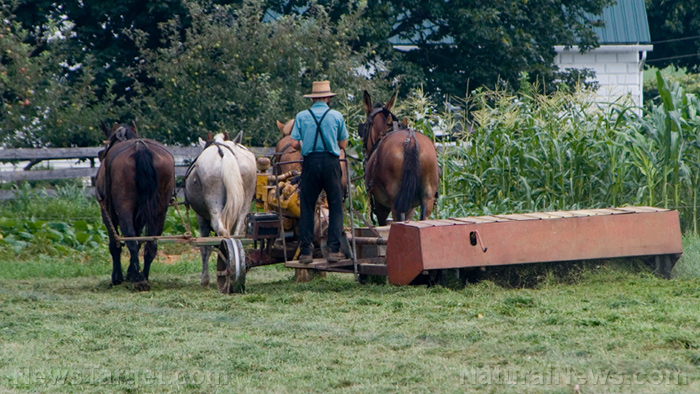Old-order Amish found to have a gene mutation that protects against aging
11/19/2017 / By Zoey Sky

It seems like we’re one step closer to finding the elusive fountain of youth. A recent study has discovered a genetic mutation in the Amish that makes them live longer.
Researchers have determined a genetic mutation in the Amish people, who live in the midwestern United States, that allegedly helps them live 10 years longer than people without it. The study is the newest clue in a search, which has taken more than a decade, for insight on healthy aging within the traditional Christian community that rejects most modern technology. (Related: Anti-aging Tips To Help You Become A Strong, Healthy Adult.)
Dr. Douglas Vaughan, chairman of medicine at Northwestern University Feinberg School of Medicine and lead author of the new research, said, “Not only do they live longer, they live healthier… It’s a desirable form of longevity.”
The scientists studied 177 members of the Berne Amish community in Indiana. They found 43 individuals who had one mutant copy of the gene SERPINE1, and these carriers lived an average of 85 years. Those without the gene in the Amish community often lived to 75.
Amish people with this gene mutation had a lower risk of diabetes, 30 percent lower fasting insulin levels, and more efficient metabolisms. The Amish kindred (immediate family and relatives) in Berne, Indiana, were genetically and culturally isolated. Dr. Vaughan explained that they are the only kindred in the world with this mutation, making it a “private mutation.” The key protein connected to cell aging seems to be PAI-1 (plasminogen activator inhibitor), which is influenced by SERPINE1.
100% organic essential oil sets now available for your home and personal care, including Rosemary, Oregano, Eucalyptus, Tea Tree, Clary Sage and more, all 100% organic and laboratory tested for safety. A multitude of uses, from stress reduction to topical first aid. See the complete listing here, and help support this news site.
Amish people with the mutation had very low levels of PAI-1, which is connected to aging in animals. However, its effect in humans remains unclear. Dr. Vaughan said that the findings were surprising because “of the consistency of the anti-aging benefits across multiple body systems.” He continued, “For the first time we are seeing a molecular marker of aging (telomere length), a metabolic marker of aging (fasting insulin levels) and a cardiovascular marker of aging (blood pressure and blood vessel stiffness) all tracking in the same direction in that these individuals were generally protected from age-related changes.”
However, Amish people with two copies of the mutant gene have a rare bleeding disorder which causes the absence of PAI-1 in the blood. Those with one copy of the mutated gene did not have a bleeding disorder. Northwestern University researchers collaborated with Japan’s Tohoku University to work on an experimental oral drug, called TM5614, that would inhibit the action of PAI-1 in Amish people with the mutant gene. The drug passed basic safety trials and is currently being tested in phase 2 trials in Japan to see if it works on insulin sensitivity in people with type-2 diabetes and obesity.
Dr. Vaughan concluded, “We hope to be able to revisit them regularly and do additional testing to look at the velocity of aging in this kindred and unearth more details about the protective effect of this mutation.”
Tips to live longer
While the study on this new drug seems promising, there’s nothing better than natural and safer ways to live a longer life.
- Form healthy habits – Try something simple like making healthier life choices. Quit smoking and drinking too much alcohol, exercise more, and eat more fruits and vegetables.
- Monitor your meals – Refraining from overeating can help you age slower.
- Don’t watch too much TV – Being a couch potato is bad for your health, and if you can’t quit it completely, limit your TV time to only two hours or less daily.
- Spend more time with family and friends – Some studies say that you increase the risk for heart disease if you don’t have a strong network of loved ones. Loneliness can lead to inflammation, and it might even cause depression in the elderly.
You can learn more about healthy eating, food freedom, and natural cures at FoodFreedom.news.
Sources include:
Tagged Under: aging, amish, genetic mutation, health, longevity, Old Order Amish, PAI-1, plasminogen activator inhibitor, SERPINE1




















